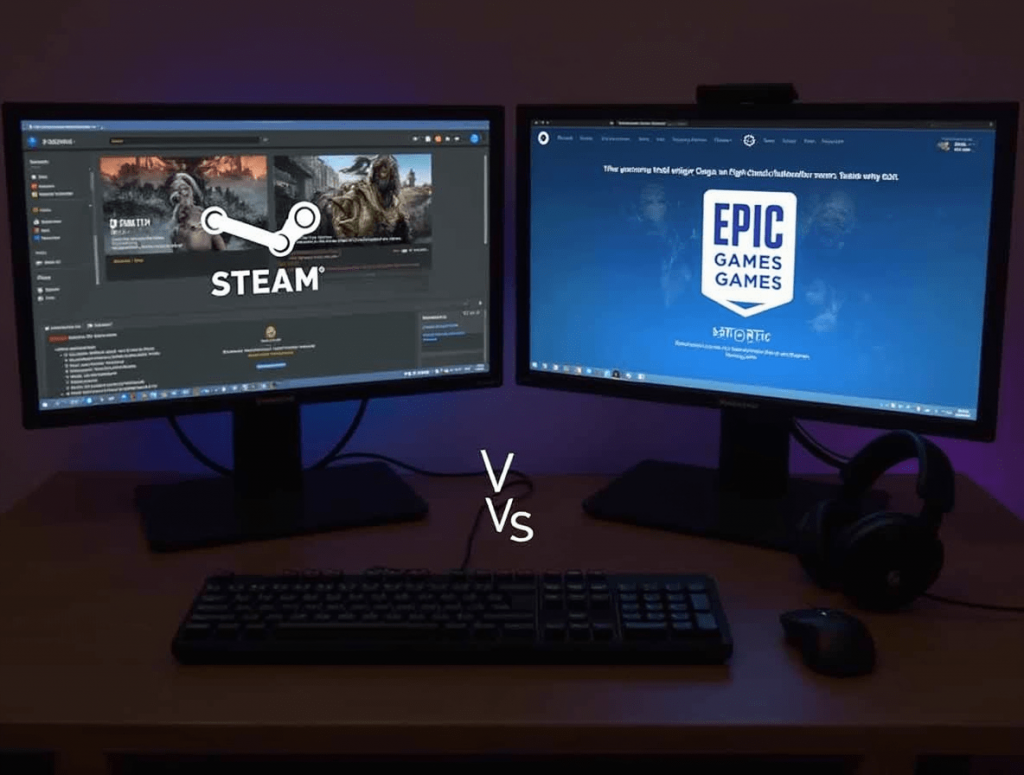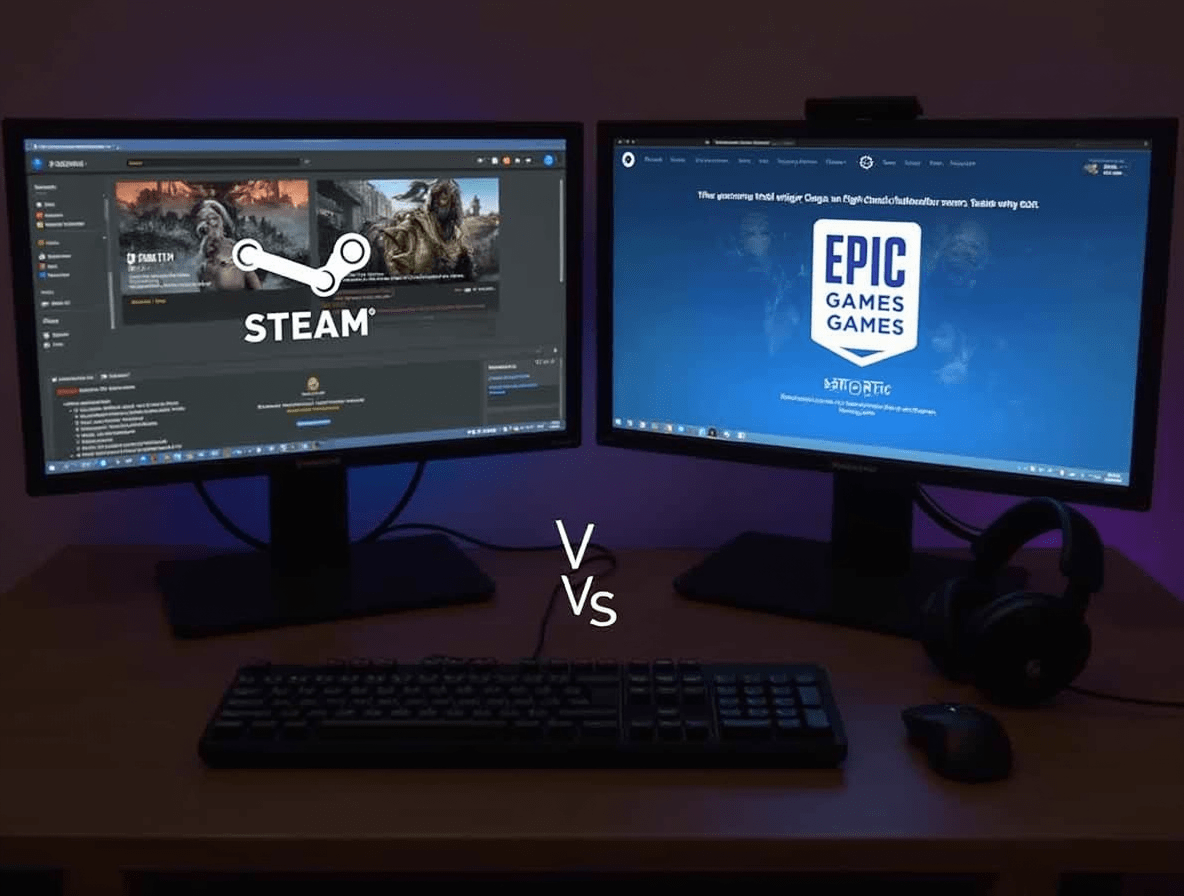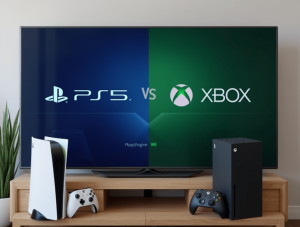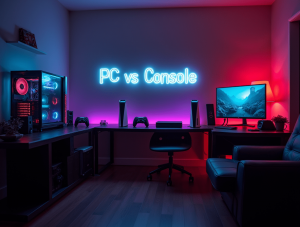
Where Should You Buy Your PC Games?
The digital PC gaming marketplace has evolved dramatically over the past decade, with two major platforms now dominating the space: Valve’s veteran Steam platform and Epic Games’ relatively newer Epic Games Store. For PC gamers, choosing where to build their digital library isn’t just about where to click “buy”—it represents an investment in an ecosystem that affects everything from game availability to social features.
Recent industry data shows Steam maintains approximately 75% of the PC digital distribution market share, while Epic Games Store has captured roughly 15% since its 2018 launch. Despite this disparity, Epic’s aggressive strategies have disrupted the status quo, forcing both platforms to compete more vigorously for both developer partnerships and consumer loyalty.
This guide examines both platforms across critical factors—from library size and exclusive titles to pricing models and user experience—to help you make informed decisions about where to purchase your PC games in 2025.
Platform History and Market Position
Steam: The Pioneer
Launched in 2003 as a method for Valve to distribute updates for its own games, Steam has evolved into the dominant force in PC gaming distribution:
- Market Dominance: Over 120 million monthly active users
- Game Library: 50,000+ titles spanning every genre imaginable
- Developer Relationships: Extensive indie support through Steam Direct
- Maturity: 20+ years of feature development and community building
Steam’s position as the default PC gaming platform has been challenged in recent years, but its extensive library and feature set continue to make it the primary destination for most PC gamers.
Epic Games Store: The Challenger
Launched in December 2018, Epic Games Store entered the market with significant financial backing from Fortnite’s massive success:
- Market Strategy: Aggressive exclusivity deals and free game giveaways
- Developer Appeal: More favorable revenue split (88/12 vs Steam’s 70/30)
- Growth Trajectory: Rapidly expanding user base of 58+ million monthly active users
- Investment Approach: Heavy spending on market acquisition rather than immediate profitability
Epic’s explicit goal has been disrupting Steam’s near-monopoly by creating competition in the marketplace, benefiting both developers and consumers in different ways.
Game Libraries and Exclusives
Steam’s Massive Catalog
Steam’s greatest strength remains its unparalleled game library:
- Sheer Volume: 50,000+ games covering every conceivable genre and niche
- Back Catalog: Extensive library of classic PC games dating back decades
- Indie Presence: Robust indie game ecosystem through Steam Direct
- Publisher Support: Nearly universal support from major publishers
- Early Access: Pioneer of the early access development model
The platform’s maturity means virtually any PC game released in the past two decades is likely available on Steam, with few exceptions.
Epic’s Curated Approach
Epic Games Store takes a more curated approach to its library:
- Selective Catalog: Approximately 1,000+ games, emphasizing quality over quantity
- Exclusive Titles: Aggressive pursuit of timed exclusivity deals
- Free Weekly Games: Ongoing program offering free games to build user libraries
- First-Party Strengths: Integration with Unreal Engine and Epic’s own titles
- Publisher Partnerships: Growing relationships with major publishers
Epic’s exclusive strategy has secured timed exclusivity for titles like:
- Borderlands 3
- Metro Exodus
- Control
- The Outer Worlds
- Tony Hawk’s Pro Skater 1+2 Remake
- Kingdom Hearts series (PC debut)
Impact on Purchasing Decisions
For consumers, exclusive arrangements create a fragmented market:
- Some players wait for Steam releases after Epic’s exclusivity periods
- Others maintain accounts on both platforms to access all desired titles
- Exclusivity deals have become less common as Epic shifts strategy
When deciding between platforms, consider whether must-play titles are exclusive to either store, as this might necessitate using both platforms.
Pricing, Sales, and Value Proposition
Steam’s Sale Structure
Steam popularized the digital game sale model:
- Seasonal Sales: Major events like Summer and Winter sales featuring deep discounts
- Weekend Deals: Regular featured promotions
- Publisher Weekend: Focused discounts on specific publishers’ catalogs
- Daily Deals: Rotating daily discounts (less common now)
- Wishlist Notifications: Alerts when wishlisted games go on sale
Steam’s discount depths typically range from 10% to 90%, with older titles receiving the steepest cuts.
Epic’s Competitive Pricing
Epic has approached pricing aggressively to build market share:
- Epic Mega Sales: Major seasonal sales events with platform-wide discounts
- Free Weekly Games: Consistent program offering 1-3 free games every week
- Epic Coupon Events: Periodic $10-15 coupons applicable to games above certain price thresholds
- Developer Incentives: Epic occasionally covers the cost of sales discounts for developers
- Regional Pricing: Improving but less comprehensive than Steam
The Epic Games Store’s free game program has been particularly impactful, with some users amassing libraries of 200+ games without spending anything.
Value Comparison
For cost-conscious gamers:
- Epic Games Store often provides better immediate value through free games and deeper sale discounts when coupons are active
- Steam typically offers more consistent year-round deals and better prices on indie titles
- Regional pricing is generally more developed on Steam, potentially offering better localized value
Both platforms regularly discount major titles, though timing differs, making price tracking services valuable for determining optimal purchase timing.
Platform Features and User Experience
Steam’s Robust Feature Set
Two decades of development have given Steam an extensive feature set:
Community Features
- Workshop: User-generated content and mod support
- Community Hub: Discussions, guides, and artwork sharing
- Marketplace: Trading of virtual items and collectibles
- Profile Customization: Extensive personalization options
- Steam Points Shop: Rewards program for customization items
Functional Features
- Remote Play: Stream games between devices
- Family Sharing: Share library with household members
- Cloud Saves: Synchronize progress across devices
- In-Home Streaming: Play games on different devices on same network
- Steam Deck Compatibility: Integration with Valve’s handheld PC
Quality of Life Features
- Big Picture Mode: TV-friendly interface
- Advanced Controller Support: Configuration for virtually any controller
- Library Management: Collections, categories, and dynamic shelves
- Robust Search and Discovery: Multiple ways to find new games
- Universal Overlay: Access community and chat without leaving games
Epic Games Store’s Evolving Platform
Epic’s platform continues to mature, though with a more streamlined focus:
Current Features
- Free Games Program: Weekly free game offerings
- Creator Support Program: Option to support content creators with purchases
- Epic Achievements: Achievement system for supported games
- Cloud Saves: Available for most newer titles
- Crossplay: Strong integration with Epic Online Services
Features Added Since Launch
- Wishlist: Added in 2020
- Self-Service Refunds: Implemented similar policy to Steam
- Library Grid View: Improved visual browsing
- Download Throttling: Bandwidth management
- Overlay: In-game access to core features
Still Missing Features
- User Reviews: Limited official review system
- Shopping Cart: Individual purchases only
- Community Forums: No integrated discussion boards
- Broadcasting: No built-in streaming capabilities
- Workshop-equivalent: Limited mod support
User Experience Comparison
The usability gap has narrowed significantly since 2018:
- Steam offers a more complete ecosystem with deeper integration between games and community
- Epic Games Store provides a more streamlined, minimalist experience focused on the games themselves
- Performance is generally comparable, though Steam’s client can be more resource-intensive
For users primarily concerned with simply playing games without additional features, the differences are less significant than they once were.
Performance and Technical Considerations
Client Performance
Both launchers impact system resources differently:
Steam:
- Higher baseline RAM usage (typically 150-300MB when idle)
- More background processes
- Longer initial startup time
- More frequent updates
Epic Games Launcher:
- Lower idle resource usage (typically 100-150MB when idle)
- Fewer background processes
- Faster startup from cold boot
- Less frequent client updates
On modern systems, these differences are negligible, but on older or resource-constrained PCs, Epic’s lighter footprint may be beneficial.
Game Installation and Management
The platforms handle game management differently:
Steam:
- Standardized installation process
- More granular update control
- Better download bandwidth management
- Backup and restore functionality
- Verity file integrity tool
Epic Games Store:
- Simpler installation workflow
- Less customization of install locations
- Improving but still limited download controls
- No built-in backup solution
- Basic repair functionality
Steam’s maturity shows in its more robust installation and maintenance tools, though Epic continues to close this gap.
DRM Approaches
Digital Rights Management varies between platforms:
Steam:
- Steamworks DRM (optional for developers)
- Offline mode requires periodic online authentication
- Some games require third-party DRM alongside Steam
Epic Games Store:
- No mandatory DRM
- Many games are completely DRM-free
- Developer choice on implementation
Epic’s more relaxed DRM approach may appeal to users concerned about ownership and preservation.
Social Features and Community
Steam’s Community Integration
Steam functions as both store and social platform:
- Friends Network: Comprehensive friends list with rich presence
- Community Groups: User-created communities around games or topics
- Discussion Forums: Integrated forums for every game
- User Reviews: Detailed review system with helpful metrics
- Workshop: Platform for user-generated content and mods
- Broadcasting: Built-in streaming capabilities
- Events: Game-specific events and announcements
Epic’s Approach to Social Gaming
Epic offers more basic social connectivity:
- Friends List: Cross-platform through Epic Online Services
- Party System: Voice chat and group formation
- Crossplay: Strong focus on cross-platform play
- Limited Community Tools: Few built-in community features
- No Integrated Forums: Reliance on external communities
- Limited User Content: No central hub for user creations
For highly social gamers who value community features, Steam’s integrated ecosystem provides a more complete experience. For those who primarily use external platforms like Discord for communication, Epic’s limitations may be less relevant.
Publisher and Developer Perspective
Revenue Sharing Models
The platforms differ significantly in their approach to revenue:
Steam:
- 30% cut on first $10M in sales
- 25% cut on sales between $10M and $50M
- 20% cut on sales beyond $50M
Epic Games Store:
- 12% cut on all sales
- Waived fees for developers using Unreal Engine (normally 5%)
This difference has been Epic’s primary competitive advantage in attracting developers, particularly indie studios where margins matter significantly.
Development Integration
Both platforms offer developers different tools:
Steam:
- Steamworks SDK with extensive features
- Better analytics and user data
- Workshop support for user content
- More promotional opportunities
- Early Access program
Epic:
- Tighter Unreal Engine integration
- Support-A-Creator affiliate program
- Potential exclusivity funding
- Less crowded marketplace
- Self-publishing remains invite-only
For consumers, these differences manifest in how games integrate with each platform’s unique features.
Making Your Decision: Platform Recommendations
Choose Steam If:
- You value a comprehensive feature set and community integration
- You’re interested in indie games and niche titles
- Mod support and workshop content are important to you
- You prefer having all games in one centralized library
- Steam’s additional features like Remote Play and Family Sharing matter to you
Choose Epic Games Store If:
- You prioritize free games and deeper promotional discounts
- You’re interested in Epic’s exclusive titles
- You prefer a simpler, more streamlined client experience
- You want more of your purchase money going to developers
- You’re primarily focused on playing games without additional features
Consider Using Both When:
- Exclusive titles on either platform interest you
- Taking advantage of the best sales across platforms
- Different friends play on different platforms
- Epic offers a free game you want to claim
- A game uses Steamworks features you value
Conclusion: Competition Benefits Gamers
The competition between Steam and Epic Games Store has ultimately benefited PC gamers through:
- Better Pricing: More frequent and deeper discounts across both platforms
- Improved Developer Economics: Better revenue sharing becoming industry standard
- Innovation Acceleration: Steam has improved its platform in response to competition
- Free Games: Epic’s giveaway program has set new expectations
- Greater Choice: More options for how and where to purchase games
While Steam’s comprehensive ecosystem still offers the most complete PC gaming experience, Epic’s challenger position has created legitimate alternatives and pushed the entire industry forward. Most PC gamers would be well-served by maintaining accounts on both platforms, using each where it makes the most sense for specific games and taking advantage of the best deals regardless of store.
For those who strongly prefer consolidation, Steam remains the most feature-complete option with the largest library—but keeping an Epic Games Store account even just for the free weekly games provides substantial value with minimal downside.
FAQ Section
Can I add my Epic Games to my Steam library (or vice versa)?
Steam allows adding non-Steam games as external shortcuts, but they won’t integrate with Steam features like cloud saves or achievements. Epic Games Store doesn’t currently offer a similar feature for adding external games to its library.
Do both platforms offer refunds?
Yes, both stores have similar refund policies: games can typically be refunded within 14 days of purchase if played for less than 2 hours. Epic’s system was directly modeled after Steam’s approach.
Which platform has better download speeds?
Download performance depends more on your location relative to server infrastructure than the platform itself. Most users report comparable download speeds between Steam and Epic, though Steam offers more granular control over bandwidth usage and download scheduling.
Will my games still work if either platform shuts down?
This varies by game. Many games on Epic are DRM-free and would continue functioning without the launcher. Steam games using Steamworks DRM would typically require the platform to authenticate, though some developers have pledged to release patches removing DRM if the service ever terminated.
Which platform is better for supporting indie developers?
Epic’s 88/12 revenue split is more financially beneficial for developers, especially indies. However, Steam offers better discoverability tools, a larger potential audience, and community features that can help indie games find success. Many indie developers choose to launch on both platforms when exclusivity isn’t a factor.
How do achievements compare between platforms?
Steam has a more established achievement system with community showcases and tracking. Epic Games Store implemented achievements more recently, and while functional, they lack some of the social features and integration of Steam’s system.














